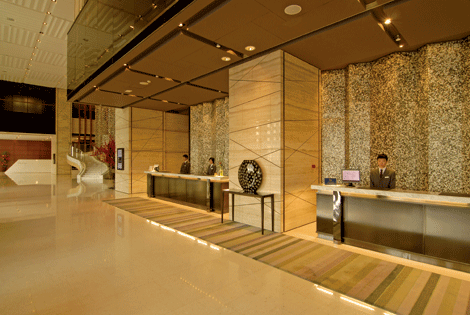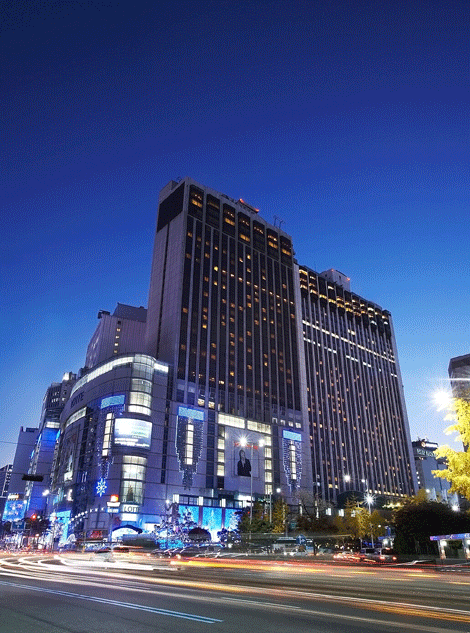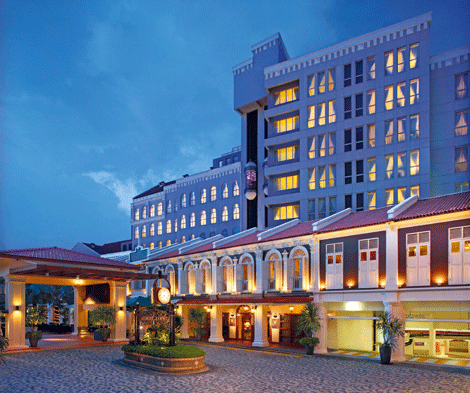Marco Polo Hotels
Who are they? A Hong Kong-based hotel group established in 1986, Marco Polo Hotels operates contemporary luxury properties in business and cultural centres across China and the Asia-Pacific region. It aims to offer a hospitality experience that is distinctively Asian in nature, as well as being warm and efficient.
Where are they? Of the group’s 13 hotels, 10 are in China, with three in Hong Kong and one each in Beijing, Foshan, Jinjiang, Shenzhen, Suzhou, Wuhan and Xiamen. The group also has two hotels in the Philippines, in the cities of Davao and Cebu. Then there is its Panwa Beach Resort in Phuket, Thailand.
What are they like? Most of the hotels have recently been renovated and have modern décor in a sophisticated, understated style, with lots of marble and wood panelling. The flagship Marco Polo Hong Kong is located in Kowloon’s Harbour City shopping centre and has 665 units, many with views over Victoria Harbour. The rooms were renovated last year, improving their layout and adding new technology such as iPod docking stations. The hotel’s 17th and 18th floors are occupied by the Continental Club (which has round-the-clock butler service), business facilities, and suites featuring a separate dining room and a walk-in closet.
Another key hotel for the group is the Marco Polo Wuhan. Located right in the city centre, this 370-room hotel overlooks the Yangtze River. It has grand, classically luxurious décor with a range of modern art pieces placed throughout the hotel, and is home to two restaurants, with Cantonese fare being offered at Shangdu Tao Yuan and international dishes at Café Marco. The Veranda, a lounge with a large window along one side offering good views, serves cocktails and signature teas.

Marco Polo Parkside Beijing
Are they for business travellers? Yes – apart from its beach resort, all the group’s hotels are in prime business districts. All provide well for business needs, with business centres and the Continental Club executive floors. Wifi is complimentary in all the lobby areas, and in the rooms of most hotels.
Is there a loyalty scheme? The group is a member of the Global Hotel Alliance (GHA) and uses its loyalty programme, GHA Discovery, which is also shared by 14 other hotel brands and more than 300 hotels around the world. Rather than points, the programme seeks to reward guests by providing them with memorable experiences and access to adventures.
The good news: Many of the hotels have recently been renovated meaning their rooms feel fresh and new, and are equipped with the latest technology.
The not-so-good news: Other than those in Hong Kong and Beijing, all of the properties are in emerging or secondary cities. While each of these locations has strategic importance – and the group intends to open hotels in other emerging Chinese cities (see below) – the lack of presence in capital cities or bigger business hubs also limits its ability to build up loyalty on a regional or global scale.
Future plans: The group has eight more hotels scheduled to open in the next five years. These include a second hotel in Suzhou, located in the city’s central business district, and hotels in the cities of Changzhou and Wuxi just west of Shanghai. They will also open new hotels in the western Chinese cities of Chengdu, Changsha, and Chongqing, together with a new hotel in the Philippine capital of Manila.
Lotte Hotels & Resorts
Who are they? South Korea’s largest hotel group, Lotte Hotels & Resorts was founded in 1973 when it took over the running of the Bando Hotel, the country’s very first commercial hotel established in 1936. Initially focused on luxury hotels in domestic cities, more recently the group has made forays into business with the launch of the Lotte City Hotels brand in 2009, and into resorts. It has also begun to expand overseas (see below).
Where are they? The group has eight hotels. There are five luxury hotels: Lotte Hotel Seoul, in the city’s Jung-gu district; Lotte Hotel World, which is also in Seoul and has a large amusement park attached; Lotte Hotel Busan, Lotte Hotel Jeju and Lotte Hotel Ulsan. There are two business brand hotels, both in Seoul: Lotte City Hotel Mapo and Lotte City Hotel Gimpo Airport (a third hotel linked through their website is Lotte City Hotel Kinshicho in Tokyo, but this is not affiliated with the group, according to a spokesperson). In 2010 the group opened its first international hotel, Lotte Hotel Moscow.

Lotte Hotel Seoul
What are they like? The flagship Lotte Hotel Seoul, the first hotel the group opened in 1979, has an impressive 1,120 rooms, along with 14 banquet halls and conference rooms, nine restaurants and a bar. Its décor is smart and sophisticated. The rooms have recently been renovated with four different designers creating separate design concepts on each floor: one has an “haute couture” look with bold marble décor and striking furnishings, while another has “essential classic” design with deep-pile sofas and a calm atmosphere. The hotel’s facilities include a full business centre and a large fitness club, with an indoor golf practice range. It also features Pierre Gagnaire à Séoul, the only restaurant run by a three-Michelin starred chef in Korea. In 2010, Lotte was awarded the Best Business Hotel in Seoul by Business Traveller readers.
The Lotte City Hotel Gimpo Airport is one of the chain’s two business-orientated City brand hotels. It has neatly decorated rooms with work desks and stationery. There is a 24-hour business corner with new computers available for use, printing and a mailing service. Other facilities include a coin-operated laundry and a fitness centre.
Are they for business travellers? Wifi is complimentary in all of the hotels, most of which are located close to business districts. Almost all have a business centre, and the City brand hotels are specially set up for business travellers with facilities including well-equipped 24-hour business centres and rooms featuring large work desks.
Is there a loyalty scheme? There are two loyalty programmes: Privilege and Trevi. Privilege members are rewarded points for a percentage of the bill paid at Lotte hotels (room 5 per cent, food and beverage 1 per cent; with the exception of Lotte Hotel Moscow which rewards 3 per cent on room stay only). These can then be redeemed for room stays, food and beverages, and in the Lotte Duty Free shops. With the Trevi programme, you pay 450,000 won (US$404) for annual membership and receive four vouchers for 50 per cent off room rates at Lotte Hotel Seoul, World, Jeju, Ulsan and Busan, along with one free buffet voucher and three sauna coupons.
The good news: Lotte offers smart and comfortable hotels which, particularly with their City brand, are well equipped for business travellers’ needs and have free wifi.
The not-so-good news: Moscow aside, at present the hotels are only in South Korea and the planned international expansion is still some way off.
Future plans: The group is planning to open business-brand Lotte City properties in Jeju City (2013), Daejeon and Seocho. It will also open two new six-star luxury business hotels, the Jamsil Lotte World II Complex and Busan Lotte Town. There are further plans to open more luxury and business hotels internationally, starting with hotels in Hanoi in 2014 and the mainland Chinese city of Shenyang in 2016.
Far East Hospitality
Who are they? Part of Far East Orchard Limited, a listed company under Far East Organization, this is Singapore’s largest hospitality management company with a portfolio of eight hotels and nine serviced residences in the country, as well as the Sri Tiara Residences in Kuala Lumpur. It specialises in mid-range to upscale properties and has three distinct brands: the trendy, boutique-style Quincy, the understated elegance and Asian touches of Oasia, and the community-style hospitality of Village. The company recently announced that it aims to significantly grow its portfolio locally and in the region, cultivating what it describes as “Singapore-inspired hospitality”.

Albert Court Village Hotel
Where are they? Apart from the Kuala Lumpur Residences, the rest of the group’s hotels and residences are located all across Singapore. The Quincy Hotel, Elizabeth Hotel and Orchard Parade Hotel are all within five minutes’ walk of Orchard Road. The Oasia hotel is about 4km farther north at Novena MRT. Albert Court Village Hotel is close to Little India, while Changi Village Hotel is near the international airport.
What are they like? The group has four hotels and four residences under its Village brand, which aims to provide an authentic, friendly stay that enables guests to explore the local culture based around the hotel’s location.
A key hotel for the Village brand is the 210-room Albert Court Village Hotel. Located near to Little India and Bugis MRT stations, it is close to many of Singapore’s cultural spots. The hotel’s décor abounds with Indian and Peranakan influences, with pre-war shophouses as part of its structure and Chinese carvings and motifs decorating its walls. It also features the Shish Mahal North Indian and Nepalese restaurant.
The 108-room Quincy Hotel, opened in February 2009, showcases the group’s trendy boutique-style brand. It has distinctive design touches throughout, such as peanut-shaped benches and a cantilevered pool sticking out from the building’s side. The room rate includes a limousine airport transfer with free wifi access during the ride, three meals a day, high-speed internet connection, all minibar amenities, and free drinks each evening.
The 438-room Oasia Hotel Singapore is this brand’s flagship. It has 100 club floor rooms designed and styled by award-winning Japanese designer Takashi Sugimoto. A 24-hour club lounge called The Living Room offers complimentary wifi and provides buffet breakfast, free cocktails and canapés each evening as well as 24-hour snacks. The hotel boasts panoramic views of the city and its own dedicated pool and spa bath.
Are they for business travellers? Several of the hotels (including The Quincy Hotel and The Elizabeth Hotel) are located within 10 minutes’ drive of the central business district, while the Landmark Village Hotel is close to the Convention and Exhibition Centre. The Changi Village Hotel provides a complimentary hourly shuttle bus to and from Changi International Airport and to Loyang and Changi Business Park. There is free wifi at The Quincy Hotel and The Elizabeth Hotel, along with all of the serviced residences. Other hotels currently charge a fee for wifi, but there are plans to make it free across the Village brand properties later this year.
Is there a loyalty scheme? As the company is currently undergoing some restructuring, whether or not there will be a loyalty programme in the future is still up in the air.
The good news: The group is planning to expand (see below). The club lounge facilities at the Oasia are top-notch, providing a full range of services including gourmet coffee and tea, chocolates from the French chocolatier Monbana, and a private access swimming pool and sun deck.
The not-so-good news: The lack of free wifi in all the locations might drive away business travellers who need technology on the road. Locations are still geographically limited and there are very few confirmed details available at the moment as to the group’s expansion plans.
Future plans: The group has said it will remain focused on growing its presence in Singapore, but is also pursuing prospects in overseas markets such as Malaysia, Thailand, Vietnam, Myanmar, Indonesia and Australia.








